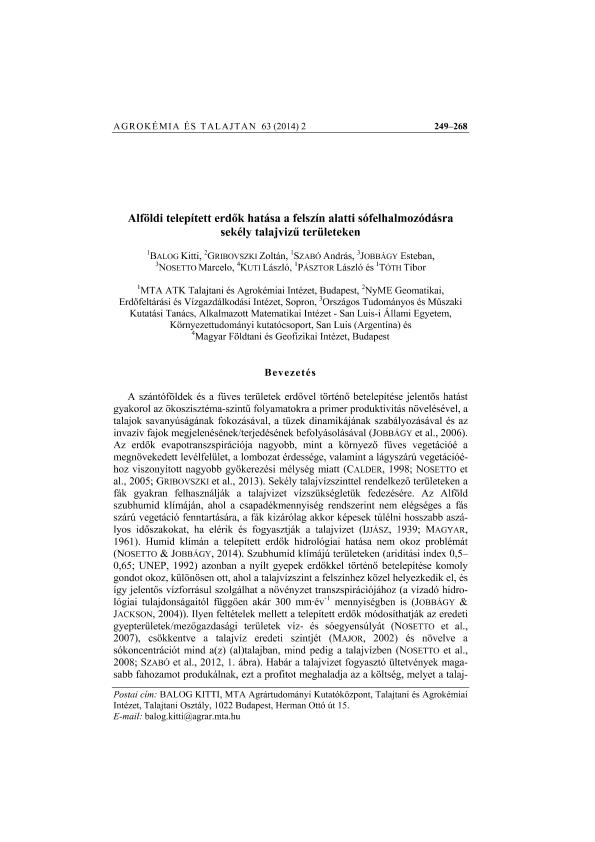Mostrar el registro sencillo del ítem
dc.contributor.author
Balog, Kitti
dc.contributor.author
Gribovszki, Zoltán
dc.contributor.author
Szabó, András
dc.contributor.author
Jobbagy Gampel, Esteban Gabriel

dc.contributor.author
Nosetto, Marcelo Daniel

dc.contributor.author
Kuti, László
dc.contributor.author
Pásztor, László
dc.contributor.author
Tóth, Tibor
dc.date.available
2016-05-24T15:35:14Z
dc.date.issued
2015-04-12
dc.identifier.citation
Balog, Kitti; Gribovszki, Zoltán; Szabó, András; Jobbagy Gampel, Esteban Gabriel; Nosetto, Marcelo Daniel; et al.; Alföldi telepített erdők hatása a felszín alatti sófelhalmozódásra sekély talajvizű területeken; Akadémiai Kiadó; Agrokémia és Talajtan; 63; 2; 12-4-2015; 249-268
dc.identifier.issn
0002-1873
dc.identifier.uri
http://hdl.handle.net/11336/5810
dc.description.abstract
Az alföldi üledékes síkságon, szubhumid klímán a füves területek és szántók helyén telepített erdők erőteljes hatást gyakorolnak a talajtani közegre, a talajvíztükör szintjére és mozgására. A fák mély gyökerezése és a korábbi vegetációnál jelentősen nagyobb vízfelvétele elősegíti a sótartalom-növekedést az altalajban, illetve a talajvízszint-csökkenést. Az erdőtelepítés globális szinten ugrásszerűen megnövekedett, Magyarországon az erdők területének növekedése elérte az évi 15.000 ha-os rátát. A telepítések főleg az Alföldet érintették, ahol az erdők részben sekély talajvizű területek gyepeit és szántóit váltották fel.Kutatásunk során alföldszerte 31 erdő-kontroll furatpár esetében talajtani, hidrológiai és biológiai terepi megfigyeléseket végeztünk, beleértve a megütött talajvízszint észlelést, a talajvíz sótartalom vizsgálatát, a földtani közeg rétegződésének leírását és a fafaj, valamint az állomány korának rögzítését. Ezen kívül talajvízszint megfigyelő kúthálózatot telepítettünk és laboratóriumban vizsgáltuk a talaj és talajvíz kémiai sajátosságait.A telepített erdők esetében a biomassza pozitív összefüggést mutatott a talaj sófelhalmozódásának mértékével, amit a fafaj (nyár > tölgy > akác) és az állománykor befolyásolt. A három vizsgált fafaj között megmutatkozó különbségek a fák eltérő növekedési erélyével és párologtatásával mutatnak összefüggést.Hazánkban a téli időszakban megfigyelhető, lefelé irányuló mély csapadékbeszivárgás a sók kimosódását eredményezi, így a sófelhalmozódás mértéke kisebb volt a talajban, mint a vizsgált, hasonló környezeti feltételekkel, de melegebb klímával rendelkező argentin pampa területeken.
dc.description.abstract
The forests that have replaced grasslands and croplands on the sedimentary plain of the Great Hungarian Plain, in a sub-humid climate, have a strong impact not only on the soil, but also on the level and movement of the groundwater table. Subsurface salt accumulation and groundwater depletion are facilitated by the significantly greater water uptake of deep-rooted trees. Forest cover has significantly increased worldwide. In Hungary, the increase in newly forested areas has reached an annual rate of 15,000 hectares. The majority of forests have been planted on lowlands with a shallow water table.A detailed pedological, hydrological and biological field survey was carried out on 31 pairs of forest and control stands. The investigation focused on water table depth and salinity, subsoil layering, tree species and stand age. In addition, a well network was installed to observe the groundwater level. Chemical characteristics of the soil and groundwater were analyzed in the laboratory.Total tree biomass was positively correlated with the rate of subsoil salt accumulation in the plantations, which was influenced by the tree species (Poplar > Common oak > Black Locust) and stand age. The mechanism behind the differences between the three tree species seems to be based on differences in growth vigour and evapotranspiration.Due to the seasonal reversal in the direction of groundwater movement in Hungary, the conditions allow regular leaching to take place and may result in less salt accumulation than in the “Pampas” examined in Argentina, which have similar environmental conditions, but a warmer climate.
dc.format
application/pdf
dc.language.iso
hun
dc.publisher
Akadémiai Kiadó
dc.rights
info:eu-repo/semantics/openAccess
dc.rights.uri
https://creativecommons.org/licenses/by-nc-sa/2.5/ar/
dc.subject
Sófelhalmozódás
dc.subject
Biomassza
dc.subject
Vízfelvétel
dc.subject
Talajvízszint
dc.subject.classification
Ciencias Medioambientales

dc.subject.classification
Ciencias de la Tierra y relacionadas con el Medio Ambiente

dc.subject.classification
CIENCIAS NATURALES Y EXACTAS

dc.title
Alföldi telepített erdők hatása a felszín alatti sófelhalmozódásra sekély talajvizű területeken
dc.title
Effect of forest plantations on subsurface salt accumulation in lowlands with shallow groundwater
dc.type
info:eu-repo/semantics/article
dc.type
info:ar-repo/semantics/artículo
dc.type
info:eu-repo/semantics/publishedVersion
dc.date.updated
2016-08-08T20:08:00Z
dc.journal.volume
63
dc.journal.number
2
dc.journal.pagination
249-268
dc.journal.pais
Hungría

dc.journal.ciudad
Budapest
dc.description.fil
Fil: Balog, Kitti. Talajtani és Agrokémiai Intézet; Hungría
dc.description.fil
Fil: Gribovszki, Zoltán. NyME Geomatikai, Erdőfeltárási és Vízgazdálkodási Intézet; Hungría
dc.description.fil
Fil: Szabó, András. Talajtani és Agrokémiai Intézet; Hungría
dc.description.fil
Fil: Jobbagy Gampel, Esteban Gabriel. Consejo Nacional de Investigaciones Científicas y Técnicas. Centro Científico Tecnológico San Luis. Instituto de Matemática Aplicada de San Luis; Argentina
dc.description.fil
Fil: Nosetto, Marcelo Daniel. Consejo Nacional de Investigaciones Científicas y Técnicas. Centro Científico Tecnológico San Luis. Instituto de Matemática Aplicada de San Luis; Argentina
dc.description.fil
Fil: Kuti, László. Magyar Földtani és Geofizikai Intézet; Hungría
dc.description.fil
Fil: Pásztor, László. Talajtani és Agrokémiai Intézet; Hungría
dc.description.fil
Fil: Tóth, Tibor. Talajtani és Agrokémiai Intézet; Hungría
dc.journal.title
Agrokémia és Talajtan
dc.relation.alternativeid
info:eu-repo/semantics/altIdentifier/url/http://www.akademiai.com/doi/abs/10.1007/s00088-014-0006-1
dc.relation.alternativeid
info:eu-repo/semantics/altIdentifier/doi/10.1007/s00088-014-0006-1
dc.relation.alternativeid
info:eu-repo/semantics/altIdentifier/doi/http://dx.doi.org/10.1007/s00088-014-0006-1
Archivos asociados
